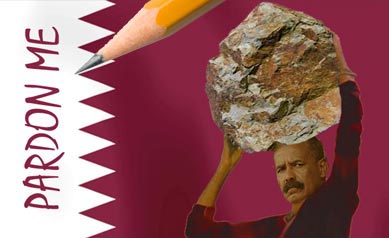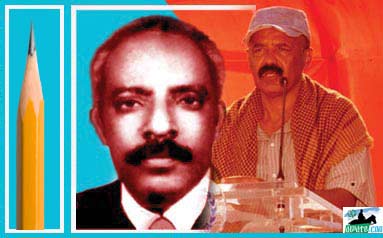A Call For Sober Dialogue

In 1967, the United Nations Security Council passed “Resolution 242” whose first call was for the “withdrawal of Israel armed forces from territories occupied in the recent conflict.” For 36 years now, Arabs in general and Palestinians specifically have been quoting “242”—sometimes using it as a battle cry, sometimes as diplomatic shorthand–to legitimize their request for Israeli withdrawal. And for 36 years now, Israelis have completely ignored the call.
To be sure, the Israel/Palestine conflict is very different from the Eritrea/Ethiopia conflict. Still, to the extent that we Eritreans are relying on the United Nations to legitimize our arguments and solve our problems; to the extent that the political and economic tools available to the UN—censure, condemnations, resolutions, sanctions—don’t always have the desired effect, particularly on authoritarian governments; and to the extent that Ethiopia is using sentimental and emotional arguments to harden its positions, we owe it to our people to go beyond stating the obvious and shouting slogans and actually suggest solutions that are in the interest of the Eritrean and Ethiopian people. What we are facing is a very difficult problem; what we are suggesting is that we should guard against making it an impossible problem.
Prime Minister Meles Zenawi’s Letter And Eritreans’ Response
On September 19, 2003, Prime Minister Meles Zenawi wrote the UN Security Council a letter stating that Ethiopia is not going to be bound by some rulings of the Boundary Commission, which were issued in April 2002, and clarified in April 2003. Specifically, he stated that Ethiopia would not accept the Boundary Commission’s verdict with regards to Badme, the “casus belli for the war between Ethiopia and Eritrea.” He proposed that demarcation (scheduled for this month) proceed on the “non-contested areas” of the East and the areas which have a natural border (Mereb) and that a new Boundary Commission be set up to deal with the other areas. In the meantime, Ethiopia would recognize the southern edge of the TMZ as the de-facto border.
From an Eritrean citizen’s standpoint—an Eritrean in Eritrea who has been displaced or is tip-toeing around minefields; an Eritrean who has been experiencing war and the winds of war for the past 6 years; an Eritrean who has been living in foxholes or experiencing the agony of being separated from those who are, the Ethiopian government’s last minute-decision must be profoundly upsetting and saddening. And it is. Yet, if one reads the many comments and opinions that were written by the Diaspora Eritreans and government officials, you’d be hard pressed to find a slight tone of sadness in Meles Zenawi’s latest outrage: they were almost unanimous in their sense of vindication. Tomes of “I told you so” were written, almost gleeful that Meles has validated what they knew. To them, what Meles Zenawi wrote was just another fulfillment of their prophecies; a timely justification for the moral cravenness they showed when they afforded the Eritrean government blanket coverage to abuse its citizens. What they offer is another invitation for Eritreans to put up with more abuse, with more torture “until the border is demarcated.” They fail to see that nothing of what they have written, nothing of what they have said gets the people of Eritrea and Ethiopia any closer to peace.
To them, that the government is “vindicated” is a preferable alternative—even if the Eritrean government has nothing to show for its vindication. Because they have pre-determined conclusions, the supporters of the Eritrean government are willing to consider only the following scenarios, one possibility of which goes something like this:
1. Ethiopia rejects the Boundary Commission’s ruling and then
2. The UN acts:
· If it directs Ethiopia to accept the Boundary Commission, Eritrea is vindicated and Ethiopia is wrong;
· If the UN accepts Ethiopia’s appeal, they are vindicated because they had asked us to be suspicious of the UN, the US and the EU who, according to them, were involved in a scheme to overthrow the Eritrean government.
3. Then Ethiopia reacts:
· If the UN directs Ethiopia to accept the ruling of the Boundary Commission and it complies, this vindicates the Eritrean government for “strangulating” Ethiopia;
· If the UN directs Ethiopia to accept the ruling of the Boundary Commission and it rejects it, this vindicates the Eritrean government for warning the world about the nature of the “minority regime.”
4. Then the UN reacts:
· the UN imposes punitive actions against Ethiopia including sanctions, and put in place the full force of Chapter VII, speeding up the “inevitable demise” of the “minority regime”;
· the UN does not take any punitive actions, this once again vindicates the Eritrean government for accusing the UN for taking sides against Eritrea.
What has not been considered, or at least given serious consideration, is the following scenario:
1. Ethiopia rejects the Boundary Commission’s ruling and then
2. the UN directs it to accept the Boundary Commission’s ruling and then
3. Ethiopia rejects the UN’s ruling and then
4. Ethiopia rejects all subsequent UN rulings, and refuses to modify its behavior even in the face of sanctions because the Ethiopian government actually gets more popular for “standing up” to the UN;
5. Wanting to withdraw UNMEE, the UN places pressure on Eritrea to open dialogue with Ethiopia;
6. Eritrea refuses.
7. The Horn of Africa gets its own “Resolution 242.”
In all these “I was vindicated,” “No, I was vindicated” chess game, one constant remains: relatively speaking, it is Eritrea, more than Ethiopia, that is suffering from this stalemate. It is Eritrea that has a disproportionately large population that is displaced or engaged in non-productive military status. But to the Eritrean government and its supporters, the “Eritrean people” are just hypothetical people: used only to advance an argument, as they have repeatedly demonstrated that they don’t consider them as citizens with full citizenship rights.
The Diaspora Ethiopians: Defining Patriotism by Hatred
Also fanning the flames of war are some Diaspora Ethiopians who want to use this opportunity to bring up long-settled issues. Experts in dead-end politics, they want Meles Zenawi to go even further down the dead-end: where he professes to accept the Algiers Agreement and reject only the Boundary Commission, they pressure him to reject the Algiers Agreement; where he bases his arguments on the premise that the boundary commission has not faithfully interpreted colonial treaties and international law, they call for the flat-out rejection of colonial treaties. Where he accepts the existence of undisputed borders, they dispute; where he accepts the fact that Ethiopia is landlocked, they question. They question something that their nation recognized over a decade ago: that Eritrea is a sovereign nation. They base their argument by stating that the Meles government did not speak on behalf of Ethiopia and it is only a duly-elected Ethiopian government that should decide on the long-settled issue of Eritrea.
They forget that nations are responsible for the acts of their governments: it is this principle that makes Ethiopians responsible for the financial debt incurred by the Derg; it is the same principle that forces Eritreans to accept the bad deal Eritrea got in the settlement of the Hanish crisis. If the people could disown the decisions of their governments, there would be no stability in this world.
Worse than their failure to reason is that supposedly well-educated people allow themselves to be fueled by hatred. Hatred for Eritrea: the land, the people and their customs. They seek not justice, but the total humiliation and destruction of Eritrea. They equate Ethiopia’s greatness with the destruction of Eritrea.
The Danger Ahead
The UN had invited the “two parties” to enter into dialogue and engage in confidence-building measures. The invitation is good, but it is directed to the wrong parties: both governments see the prevailing no-war, no-peace environment as the perfect combination to enhance their status and monopolize power.
A review of Meles Zenawi shows that (a) domestically, his popularity within his constituency, and the constituency he hopes to impress, is tied to his hostility to Eritrea, and (b) internationally, he is very keen on guarding his reputation for being a shrewd and intelligent person and he wants to remain well-liked by the donor nations. He cannot satisfy both constituencies by either fully accepting or fully rejecting the ruling of the Boundary Commission. On the other hand, if he can create a new reality by instigating a conflict (because he knows that his equivalent on the other end is a hot-head who can be provoked easily), he can state that the ruling of the Boundary Commission is null and void and that it is time for a new deal, a deal that takes into consideration that Ethiopia is militarily in a better position than Eritrea. Thus, it is in his personal interest to have a war.
A review of Isaias Afwerki shows that (a) domestically, his popularity took a dive after the Eritrea-Ethiopia conflict and (b) internationally, he doesn’t care a bit about the opinion of the international community, who despise him. He knows that demands for reform, political pluralism and an improvement in people’s lives become secondary issues in times of war and it is in his interest to have, if not a war, at least a state of no-peace.
For far too long, exclusionist, extremists, militants, and provocateurs have dominated the political landscape of Eritrea and Ethiopia. We believe that the average Eritrean and Ethiopian is peace-loving and justice-loving and that, if given an opportunity to speak, to write, to vote, to organize, would have expressed this wish far better than those who claim to represent him or her.
Unfortunately, for now at least, who is dominating the two nations are the forces of hatred and prejudice, the forces of militancy and war, the forces of arrogance and chauvinism. Most people are peace-loving which is why, in democracies, war is truly rare. Until Eritrea and Ethiopia are represented by governments who express the wishes of the common person, we will continue to have what we have now: (1) governments who use war and the threat of war as the ultimate means of job security and (2) intellectuals who use flag-waving as a way to endear themselves to those in power and/or gain notoriety.
In 1998, when war broke out between Eritrea and Ethiopia, almost all of us were caught flat-footed. We cannot claim that this time. What is needed is a dialogue—but a dialogue of the sober-minded, a dialogue of citizens, one that excludes Ethiopian extremists who want to reverse Eritrea’s independence and Eritrean extremists who pray for the disintegration of Ethiopia. If we fail to do that, there is a real risk of presenting the Horn of Africa its own tragic “resolution 242.”




Awate Forum